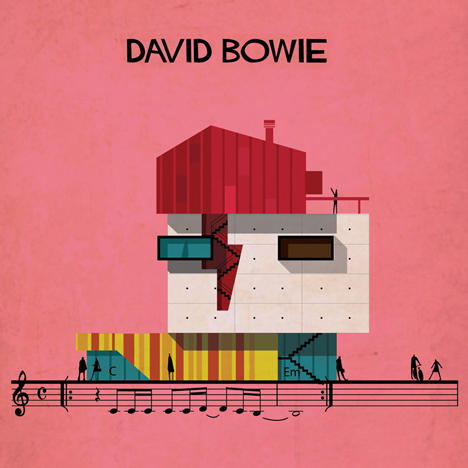The latest poster series from Italian architect and illustrator Federico Babina takes 27 popular songs, from the likes of David Bowie, Amy Winehouse, Elvis Presley and Mozart, and transforms them into cartoon buildings.
The series, entitled Archimusic, combines the music and lyrics of each song with the artwork featured on the original single and album covers, creating a series of fantasy designs that feature stacked shipping containers, towering chimneys and sculptural staircases.
"The parallels between architecture and music are diverse and extraordinary," Federico Babina Dezeen. "They have a common mathematical order which regulates the forms and the rhythm."
"The idea was to tell a story starting from the soundtrack, listen to the music and imagine the shapes hidden behind it," he said.
Babina previously worked on a similar project named Archist, transforming the works of famous artists into buildings. Here, the process becomes less literal, as the illustrator created shapes based on the mood and feelings created by each song.
"Archist has been a figurative process while Archimusic is more intangible and abstract," he said. "It is based on feelings and emotions that only the music is able to awaken. Use your ears instead of eyes to conceive shapes."
The series starts with So What, a 1950s track by Jazz artist Miles Davis. Here, the familiar parts of a trumpet form projecting balconies and a big chimney.
"His music moves in a perfect balance between harmonic simplicity and an ingenious difficulty," said Babina. "It was the perfect example to transform the rhythm of notes into a sequence of colours and shapes."
The iconic cover of Joy Division's Unknown Pleasures gives a jagged profile to the image dedicated to the band's 1980 hit Love Will Tear Us Apart, while a pair of matching red and black structures accompany Seven Nation Army by the White Stripes.
Babina also looked at classical artists, created a faceted cave-like structure based on the music of Bach and a piano-inspired structure dedicated to Mozart.
There is also a bulbous form for flamenco guitarist Paco de Lucía and a tensile structure for experimental performance artist Laurie Anderson.
"I chose types of music and musicians very different from each other. Each has its own peculiarities," added Babina.
"I do not have a favourite kind of music – I think there is always a perfect kind of music for an exact time," he said.
Other highlights from the series include a colourful composition of structures for Manu Chao, a guitar-shaped building for Jimi Hendrix, a concrete bunker for Nirvana and a four-gabled warehouse for the Beatles.
Federico Babina has also created posters showing architects' faces made from their designs and an illustrated alphabet made from famous buildings. See more illustration by Babina »
Here's some extra information from the artist:
Archimusic blends music and architecture
Twenty-seven songs make up the soundtrack of this series of illustrations depicting the music and its authors.
The idea was taking cue from an intangible item like music, giving shape light and colour to music and its performers. An exercise to uninhibited sense and try to listen to architecture and to observe music. Be guided by the sequence of notes to give form and life to architectural forms.
Music and architecture are intimately joined by a cosmic connection. They both are generated by an underlying code, an order revealed by mathematics and geometry.
Music is an art form whose medium is sound and silence.
If music is horizontal, vertical or oblique. If the sound leans firmly on the ground or if it touches on tiptoe. If it's made of contrasting colours or tones that change gradually. Shaping architecture walking on the musical staff. The stave as a metaphor of structural foundation on which rests a "musical architecture".
As abstract art shape based on rhythm, proportion and harmony, in these images architecture and music share a clear cultural lineage. The colour and the different nuances of music shape the forms and volumes.
Reading horizontally gives some basic melodic lines, while reading vertically reveals both harmony and dissonance. A building like an harmonic progression following the movement of chords. A spatial progression that is equivalent to the harmonic progression through chords. Generate a rhythm of solids and voids to reproduce the sequences of notes and silences.
Try to listen to the architecture. Interpret the its musicality and rhythm. Leave notes drawing an imaginary architecture following the rhythm of the imagination.

